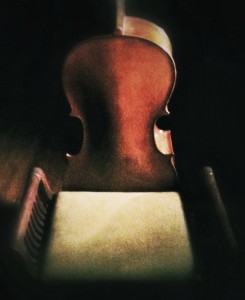WHAT BEETHOVEN TAUGHT ME ABOUT POINT OF VIEW
 The other day, while trying to find my way out of the labyrinth of a mixed metaphor I’d been torturing, I turned, as one does, to Google to stock up on more paraffin to throw on the fire. A few clicks later and I was reading about Beethoven’s Konversationshefte, or conversation notebooks, which are said to provide an invaluable historical record of his thoughts on music. In essence, Beethoven used these notebooks as a written hearing-aid, passing the notebooks to friends and family so they could write down whatever they wanted to say. It seems there were a staggering 400 of these jewels, although less than half now remain.
The other day, while trying to find my way out of the labyrinth of a mixed metaphor I’d been torturing, I turned, as one does, to Google to stock up on more paraffin to throw on the fire. A few clicks later and I was reading about Beethoven’s Konversationshefte, or conversation notebooks, which are said to provide an invaluable historical record of his thoughts on music. In essence, Beethoven used these notebooks as a written hearing-aid, passing the notebooks to friends and family so they could write down whatever they wanted to say. It seems there were a staggering 400 of these jewels, although less than half now remain.
My initial reaction was, wowsa, what a fantastic resource for scholars. Imagine having the definitive answers to all sorts of questions you’d love to ask Beethoven helpfully written out by his own hand. Then I read on, and discovered Beethoven’s notebooks were much, much more interesting that this.
For although Beethoven’s friends and colleagues frequently wrote to him in these notebooks, he didn’t always write back, preferring to reply orally. So, in some cases, what has been preserved is a written record of one side of a fascinating dialogue in which key questions are put to the great man and then…well, that’s sort of it. For pages at a time, other people’s questions are interspersed only with their own comments – while there is only frustrating silence from Beethoven himself. Presumably, his friends and family never bothered to write down Beethoven’s side of the story because they were too busy scrawling off their supplemental questions.
Can you imagine the pain of those poor scholars? To be soooo close and yet…
Needless to say, this has meant that mining all the nuances and crevices implied by the supplemental questions has kept Beethoven obsessives busy for centuries. This, presumably, unintentional outcome of the notebooks appealed to me for several reasons, not least that it means that, like the best novels, if you want the Konversationshefte to reveal its secrets, you cannot simply read line-by-line. You must approach it ready, willing, and eager, to read between the lines.
Meanwhile, back in my earlier tangled metaphor, I had started out by wondering what creative limits, if any, Beethoven himself felt were imposed by his deafness. Luckily for me, it turns out there is no real shortage of specialists who have winkled out the nuances of the Konversationshefte on this score. In 2002, Dominique Prévot polled a range of specialists for their views, and published them on his helpful site www.lvbeethoven.com.
In his reply to Prévot, Willem Holsbergen, cites ‘the following remarks by nephew Karl: “Precisely because of that [your deafness] you are famous. Everyone is astonished, not just that you can compose so well, but particularly that you can do it in spite of this affliction. If you ask me, I believe that it even contributes to the originality of your compositions.”‘
I gasped and read it again.
Was I just imagining quite how wounding this arrogance of youth must have felt to Beethoven? Both horrified and thrilled by this twist, this promise of drama to come, I read on, eager to hear the great man’s scathing reply. Unfortunately, young Karl’s dismissive comments seems to have sparked one of those moments when Beethoven was moved to eschew the notebooks and just go with the sound of his own voice. Which leaves us trying to guess at what he might have said by reading between the lines of Karl’s follow-up entry in the notebook. “Nevertheless, I believe that even the greatest genius, when hearing someone else’s compositions, subconsciously copies ideas. In your case that doesn’t happen, because you have to create everything from within yourself.”
As Holsbergen points out, ‘Karl’s “nevertheless” suggests that Beethoven did not agree with his previous remark, “that it even contributes to the originality of your compositions.” Because we don’t know Beethoven’s exact answer, one can of course create different interpretations for this passage.’
I’m sure Holsbergen is right about this. In my own ‘different interpretation’ of this passage I had no real trouble imagining Beethoven’s reply being delivered while chasing poor Karl around the room with a whip and a chair. Not that this was getting me anywhere with my garbled silence/deafness/sound pressure metaphor, which by then I’d decided to cut anyway.
But later that evening, as my thoughts returned to Beethoven and his notebooks, it struck me there was a helpful metaphor here. For what are these one-sided conversations of his, if not a masterclass in POV and how it can be wielded to keep everyone guessing, to make sure the reader is right where you want them, reading between the lines.
